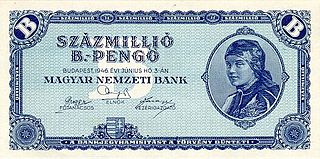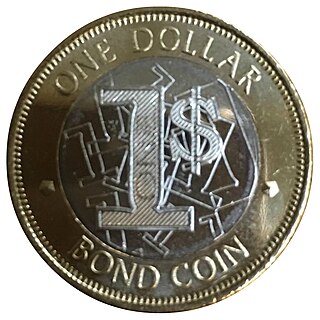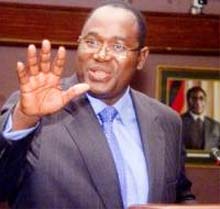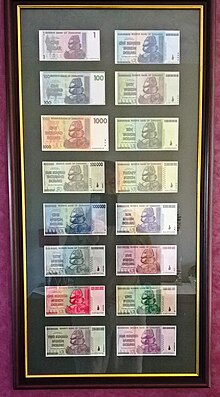
In economics, hyperinflation is a very high and typically accelerating inflation. It quickly erodes the real value of the local currency, as the prices of all goods increase. This causes people to minimize their holdings in that currency as they usually switch to more stable foreign currencies. Effective capital controls and currency substitution ("dollarization") are the orthodox solutions to ending short-term hyperinflation; however there are significant social and economic costs to these policies. Ineffective implementations of these solutions often exacerbate the situation. Many governments choose to attempt to solve structural issues without resorting to those solutions, with the goal of bringing inflation down slowly while minimizing social costs of further economic shocks.

The economy of Zimbabwe is a gold standard based economy. Zimbabwe has a $44 billion dollar informal economy in PPP terms which translates to 64.1% of the total economy. Agriculture and mining largely contribute to exports. The economy is estimated to be at $73 billion at the end of 2023.
Operation Murambatsvina, also officially known as Operation Restore Order, was a large-scale Zimbabwean government campaign to forcibly clear slum areas across the country. The campaign started in 2005 and, according to United Nations estimates, affected at least 700,000 people directly through loss of their homes or livelihood and thus could have indirectly affected around 2.4 million people. Robert Mugabe and other government officials characterised the operation as a crackdown against illegal housing and commercial activities, and as an effort to reduce the risk of the spread of infectious disease in these areas.
Herbert Muchemwa Murerwa is a Zimbabwean politician. He served as the Finance Minister of Zimbabwe from April 1996 to July 2000, from August 2002 to February 2004, and again from 26 April 2004 to 6 February 2007. He has been Minister of Lands and Land Resettlement since February 2009.

The Reserve Bank of Zimbabwe is the central bank of Zimbabwe and is headquartered in Harare.
Zimbabwe began experiencing a period of considerable political and economic upheaval in 1999. Opposition to President Mugabe and the ZANU-PF government grew considerably after the mid-1990s in part due to worsening economic and human rights conditions. The Movement for Democratic Change (MDC) was established in September 1999 as an opposition party founded by trade unionist Morgan Tsvangirai.
David Butau was a member of parliament of Zimbabwe representing the district of Guruve North. He was chairman of the parliamentary Portfolio Committee on Budget and Finance.
Webster Kotiwani Shamu is a Zimbabwean politician and former Minister of Mashonaland West Provincial Affairs who was fired by President Emmerson Mnangagwa on 21 May 2018. He previously served as Minister of Information and Publicity, and as Minister of State for Policy Implementation. He is a member of parliament representing the Chegutu constituency. The Cabinet of Zimbabwe was later dissolved on 27 November 2017.

Hyperinflation in Zimbabwe is an ongoing period of currency instability in Zimbabwe which, using Cagan's definition of hyperinflation, began in February 2007. During the height of inflation from 2008 to 2009, it was difficult to measure Zimbabwe's hyperinflation because the government of Zimbabwe stopped filing official inflation statistics. However, Zimbabwe's peak month of inflation is estimated at 79.6 billion percent month-on-month, 89.7 sextillion percent year-on-year in mid-November 2008.

The banknotes of Zimbabwe were physical forms of Zimbabwe's first four incarnations of the dollar, from 1980 to 2009. The banknotes of the first dollar replaced those of the Rhodesian dollar at par in 1981, one year after the proclamation of independence. The Reserve Bank of Zimbabwe issued most of the banknotes and other types of currency notes in its history, including the bearer cheques and special agro-cheques that circulated between 15 September 2003 and 31 December 2008: the Standard Chartered Bank also issued their own emergency cheques from 2003 to 2004.

The Zimbabwean dollar was the name of four official currencies of Zimbabwe from 1980 to 12 April 2009. During this time, it was subject to periods of extreme inflation, followed by a period of hyperinflation.
Johannes Tomana was a Zimbabwean attorney. He served as Prosecutor-General of Zimbabwe from November 2013 until his dismissal in June 2017.
Trust Banking Corporation (TBC), commonly referred to as Trust Bank, is a commercial bank in Zimbabwe. It is one of the commercial banks in the country, licensed by the Reserve Bank of Zimbabwe, the national banking regulator.

The Reserve Bank of Zimbabwe began to release Zimbabwean bond coins on 18 December 2014. The coins were supported by a US$50 million facility extended to the Reserve Bank of Zimbabwe by Afreximbank. To date coins worth US$15 million have been struck out of the total $50 million available. The coins were first issued in denominations of 1, 5, 10, and 25 cents and are pegged to the corresponding values in U.S. dollars. A 50 cents bond coin was released in March 2015.
Fidelity Printers and Refiners (FPR) is Zimbabwean security printing and gold refinery company wholly owned by the Reserve Bank of Zimbabwe. The company was established in 1966. FPR operates from a printing and gold refinery plant located in Msasa Industrial area in Harare and a coin minting facility in Bulawayo.

The 2016–2017 Zimbabwe protests began in Zimbabwe on 6 July 2016. Thousands of Zimbabweans protested government repression, poor public services, high unemployment, widespread corruption and delays in civil servants receiving their salaries. A national strike, named "stay-away day," began on 6 July and subsequent protests took place across the country and diaspora.
John Panonetsa Mangudya is a former governor of the Reserve Bank of Zimbabwe. He was appointed in March 2014 by the then Zimbabwean president, Robert Mugabe, and began his tenure as governor on 1 May that year. His second 5 year term ended on 28 March 2024. He succeeded Gideon Gono as the governor of Zimbabwe's central bank and became the nation's 6th substantial exchequer.

Zimbabwean Bonds were a form of legal tender near money released by the Reserve Bank of Zimbabwe which attempts to resolve Zimbabwe's lack of currency. Bonds and were pegged against the U.S. dollar at a 1:1 fixed exchange rate and backed by the country's reserve. Since abandoning the Zimbabwean dollar in 2009 after it went into hyperinflation the country began using a number of foreign currencies including the U.S. dollar, South African rand, British pound and Chinese yuan as a means of exchange. The inability to print these currencies led to a shortage of money with banks issuing limits on withdrawals.

The Zimbabwean dollar, also known as the Zimdollar or Real Time Gross Settlement (RTGS) dollar, was the currency of Zimbabwe from February 2019 to April 2024. It was the only legally permitted currency for trade in Zimbabwe from June 2019 to March 2020, after which foreign currencies were legalised again.
The Zimbabwe Gold is the official currency of Zimbabwe since 8 April 2024, backed by US$575 million worth of hard assets: foreign currencies, gold, and other precious metals. It replaced the Zimbabwean dollar, which suffered from rapid depreciation, with the official exchange rate surpassing 30,000 Zimbabwean dollars per U.S. dollar on 5 April 2024, whilst the parallel market rate reached 40,000 per U.S. dollar. Annual inflation in Zimbabwe hit 55.3% in March 2024.










